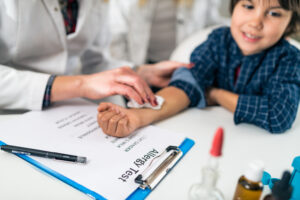February 01, 2022 | Black & Kletz Allergy

Skin testing is a simple and common procedure used to detect what an individual is sensitized (i.e., allergic) to. It entails the application of a small amount of a chemical antigen, which is extracted from the natural allergy causing substance, on the skin and then interpreting the result after approximately 15 to 20 minutes. Allergic individuals carry proteins called specific antibodies. These antibodies, which are found in the bloodstream, react to various external allergenic triggers depending on the sensitivity of the child.
When the antigen or allergen is introduced into the top layers of the skin with a small plastic toothpick-like applicator, the corresponding antibodies react with the antigen and release chemicals, such as histamine, at the site of reaction. These chemicals cause stretching of the blood vessel walls as well as fluid leakiness into the surrounding tissues. A positive skin test reaction will appear as a small raised bleb or wheal with redness surrounding the raised bleb at the site of the skin test area. This reaction confirms the presence of specific antibodies against the antigen and thus proves that the child is allergic to the substance being tested since it triggered the production of these antibodies.
The ability of the skin to react to outside allergy-causing substances is present at birth. It is true that most children do not develop sensitivities to outdoor allergens such as tree, grass, and/or weed pollens until about the age of 2 or 3. However, they can be sensitized to indoor allergens (i.e., dust mites, pet dander, cockroach) much earlier than that. Many infants can be allergic to foods even during the first few weeks of life. Since this is true, it is appropriate to skin test young children as soon as they develop allergy-related symptoms.
The consideration of allergy immunotherapy (i.e., allergy shots, allergy injections, allergy desensitization, allergy hyposensitization) is not the only reason to skin test children. If we can detect which food a child is sensitized to, we can prevent food-induced reactions by eliminating the offending food and substituting it with suitable alternatives. The identification of specific indoor environmental allergy triggers in young children will also enable us to implement proper control measures in order to reduce their exposure to those allergens which will in turn reduce their symptoms and decrease the need for medications.
Allergy skin testing is mainly done in children when one is trying to assess if a child may have food allergies, allergic rhinitis (i.e., hay fever), insect sting (i.e., bees, wasps, hornets, yellow jackets) allergies, medication allergies, and/or asthma. Although skin testing is the preferred method, the allergist will determine which type of allergy testing is appropriate for each child depending on whether the child is taking a medicine that may prevent or reduce a reaction to a skin testing substance, has a skin disorder that makes it difficult to see the results of skin testing, or has had a previous allergic reaction to skin testing with severe symptoms, which is extremely uncommon. Skin prick testing in children causes very little discomfort and is well tolerated. It is also safe and as stated above, adverse effects from skin testing are extremely rare.
The board certified allergy specialists at Black & Kletz Allergy in the Washington, DC, Northern Virginia, and Maryland metropolitan area will gladly answer any questions and concerns about allergy skin testing for both children and adults. Dr. Michael Kletz and Dr. Appaji Gondi at Black and Kletz Allergy, have been diagnosing and treating individuals with hay fever (i.e., allergic rhinitis), asthma, sinus problems, insect sting allergies, hives (i.e., urticaria), eczema (i.e., atopic dermatitis), swelling episodes (i.e., angioedema), food and medication allergies, and immunological problems for more than 60 years combined. We have an office in Washington, DC and 2 other offices in Northern Virginia with locations in McLean, VA (Tysons Corner, VA) and Manassas, VA. All 3 office locations offer on-site parking and the Washington, DC and McLean, VA locations are also Metro accessible. There is a free shuttle that runs between our McLean office and the Spring Hill metro station on the silver line. For an immediate appointment, please call us or you may click Request an Appointment and we will respond within 24 hours by the next business day. The allergy doctors at Black & Kletz Allergy pride themselves in providing excellent state-of-the-art allergy and asthma care in a professional and compassionate environment.












